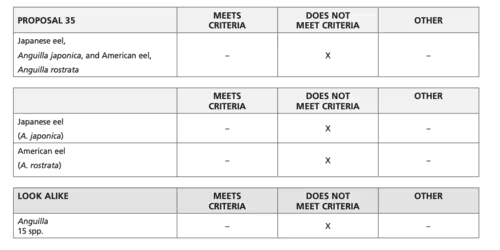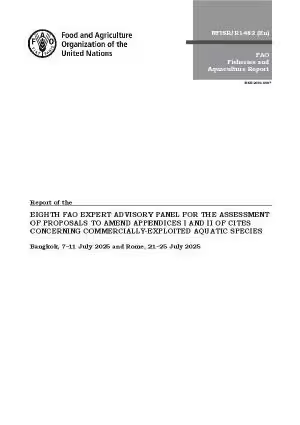FAO Publishes Review of CITES Proposals for Aquatic Species
The Food and Agriculture Organization of the United Nations (FAO) has published the Expert Advisory Panel report reviewing proposals to list commercially exploited aquatic species under the Convention on International Trade in Endangered Species of Wild Fauna and Flora (CITES). The report compiles the Panel’s scientific and technical assessments conducted in July 2025.
Proposal No. 35 concerns the listing of eels (Anguilla spp.). Prof. Hiroshi Hakoyama of the Institute for Freshwater Biology contributed to the evaluation of this proposal as a member of the Expert Advisory Panel.
Full text: FAO Open Knowledge Repository
FAO EXPERT PANEL ASSESSMENT REPORT OF PROPOSAL 35: Japanese eel, Anguilla japonica, and American eel, Anguilla rostrata, plus all Genus Anguilla
This proposal is for inclusion of the Japanese eel, A. japonica and the American eel, A. rostrata in Appendix II, Under Annex 2 (a) criterion B.
It also includes all non-CITES species of the genus Anguilla in CITES Appendix II in accordance with Article II, Paragraph 2 (b) for reasons of similarity to $A. anguilla$, or to one of the species proposed (A. japonica and A. rostrata) in live or processed form.
EXPERT PANEL RECOMMENDATION

Japanese eel and other look alike eels The Expert Panel assesses Proposal 35 not to meet the CITES listing criteria. This conclusion is based on a comprehensive evaluation of the best available scientific data and technical information, which indicates that $A. japonica$ and related species exhibit medium inherent productivity, large effective population sizes above the Appendix II extent of decline threshold, and low extinction risk as demonstrated by Population Viability Analysis (PVA). Furthermore, the suggested direct linking of international trade to population declines across the genus is not well supported by the evidence. Existing regional and national management measures across Asia are extensive and demonstrably effective, particularly in eastern Asia where cooperative frameworks and practical species identification methods support sustainable use and trade monitoring.
While an Appendix II listing might offer some regulatory harmonization benefits, the risks of unintended negative consequences - including increased illegal trade, market distortions and the disruption of successful management cooperation - are considerable. Therefore, the Expert Panel expresses moderate to high confidence in the result of their evaluation, emphasizing that targeted conservation actions and strengthened species and region-specific management represent more effective pathways to sustainable conservation outcomes than a premature genus-wide listing.
